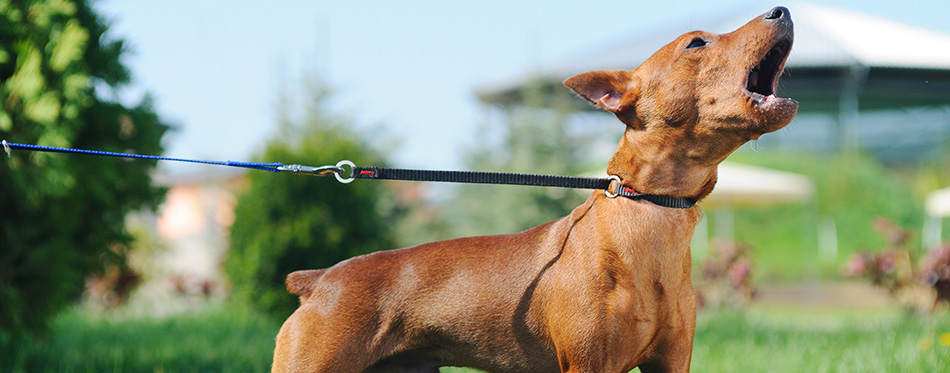While many pet owners worry that their dog barks too much, having a quiet canine can also be a cause for concern. Although it may sound like the ideal scenario – especially for your neighbors – a yap-less dog just doesn’t seem right.
However, a dog that doesn’t tend to bark is not as rare as you would think, and there are many reasons why they may have ‘lost their voice’.
We take a look at why your dog doesn’t bark and what you should do if you are really concerned.

Why Dogs Bark
Barking is a natural thing for a dog to do, and there are numerous reasons behind their distinct vocal display, from fear or frustration to sheer excitement.
Unlike more silent pets such as cats, your dog’s barking is a warning to someone to stay away or to alert you to a potential threat.
He may also be barking in anger or fear, with boredom and frustration also triggering his yapping.
While cats tend to purr their emotions, a dog’ bark is also a good way for your pet to show his feeling, including excitement, say when you come home from work or he sees his leash and knows he’s about to go out and play.
Reasons Why a Dog May Not Bark
For every noisy, vocal pooch there is a much quieter or even silent dog, who for various reasons seems to have lost his voice. Here are the main possibilities to answer the question: why doesn’t my dog bark?
Breed
A dog’s bark is one of the original reasons why humans started to bring wild dogs into their fold, as they recognized the benefit of having domesticated animals that could warn them of intruders or danger. And this has led to the breeding of iconic guard dogs such as German Shepherds.
But there are other breeds of dogs that are not so vocal or are bred to make different sounds.
Hounds, for example, tend to ‘bay’, which is more of drawn-out howl rather than more conventional barking and which tells their handler where they – and their prey – are located in the undergrowth.
Then there are breeds that are known to be quiet, or much less vocal, only barking when absolutely necessary. These include the giant breed, the Newfoundland, which is also known to be one of the quietest dog breeds you can find and will rarely bark. The Shar Pei is also a ‘seen and not heard’ type of breed.
And breeds that are prized for their calm nature also tend to be dogs that go about their life in silence, without conventional barking such as the Basenji.
The Basenji, which originated as a hunting dog in Africa, is actually known as the barkless dog, as when it does vocalize, it doesn’t have a bark as such, but a unique sound described as a cross between a chuckle and a yodel.
Personality
The reason your pooch is a quiet dog could be simply down to their personality traits, and not breed genetics.
Particularly if you have a laid-back, non-attention seeking type, your dog’s personality may mean they don’t need to always bark to get what they need, saving their voice for occasions when barking is really needed.
Or their personality could be more on the shy side and your dog is happy to take more of a backseat when it comes to barking out their orders.
As long as everything else with your dog seems ok, and they are not showing signs of depression, then dogs with a quiet disposition is not a bad thing to have!
‘New Dog’ Scenario
When you bring a new dog into your home, there will always be a ‘honeymoon’ period where you are all working each other out and getting used to the new domestic arrangement.
And particularly if your pup is a rescue dog, then they will need time to adjust and settle down, which could result in them appearing quiet or prefer silence.
But as they build up their confidence and realize this is their home, chances are their voice will come back loud and clear.
Past Experience and Trauma
Their past experience may also offer clues as to why some dogs won’t bark, particularly if you got them as an older pup or adult dog or they are a shelter dog.
Some dogs may have been deliberately trained to stop barking, using methods including punishment training and the use of a shock collar and so are actually fearful of being vocal. You may also like our article on the best dog silencers.
Past trauma and abuse can also impact on a dog’s behavior and lead them to choose to be silent or rarely bark, so they can keep themselves safe and unnoticeable.
Age
Aging dogs can also lose their barking ability for a host of reasons. Hearing loss, which is common in senior dogs, can mean your dog won’t react to sounds – or even hear them – as much as younger dogs on high alert with keen hearing.
So, when the doorbell rings, your senior age chap has probably not heard the delivery man and so won’t react with his usual bark warning to the noises.
Vocal cords and the voice box in old dogs can also lose their flexibility, leading to a much quieter bark as can canine dementia, where dogs can simply lose interest in the sounds and activities going on around them.
Medical Issues
One of the most important things on the list to rule out if your dog is not barking as much as they did is a medical reason behind their loss of voice.
A dog unable or unwilling to bark can be due to a health issue, as can a bark that’s quieter and not as strong as it used to be. And especially if your dog is not as energetic or shows other symptoms of being unwell, then a trip to the veterinarian is a good idea.
Any conditions that affect the larynx (voice box) is known as laryngeal disease and will cause problems with the volume of a dog’s bark as well as how comfortable they are when they do try to vocalize.
Some breeds of dogs are also pre-dispositioned to issues with the larynx, including the Newfoundland and St Bernards, which have an increased risk of a condition called ‘acquired paralysis’.
This form of voice box paralysis can be triggered by trauma, stress and even cancer. Acquired paralysis results in a restricted airflow through the larynx, reducing the dog’s ability to make any sound.
Other potential causes behind why your dog doesn’t bark can include cancer of the larynx, throat or salivary glands as well as a stroke, chronic vomiting and respiratory disease.
Excessive barking can also irritate the voice box and throat, leaving dogs sounding hoarse.

What to Do if Your Dog Doesn’t Bark
If your dog appears to have lost their voice, there are some ways you can help return your pet from his world of silence and hopefully get him happily barking again.
Work Out the Cause
If you suspect the lack of barking is due to breed or personality and in every other way your pup is happy and healthy, then accept your dog as he is.
Get Him Checked Out
If your dog’s lack of barking has come on suddenly or he is also showing signs of discomfort or generally feeling unwell, then take them to your veterinarian, to rule out any medical causes.
Your vet can conduct a full check to see if there are any underlying health issues or conditions going on and potentially schedule the appropriate procedure or treatment to help get your dog barking again.
Give it a Little Time
Especially if you suspect your dog’s past is behind their lack of barking, or he is a new member of the family, a little time, love, and attention could help to rectify the problem.
Time will allow your dog to adjust to a new situation and become more comfortable around you and your family.
Coupled with plenty of reassurance, positive attention, exercise, and play, time is one of the best ways you can gradually support your dog to relax and hopefully find his confidence and voice again.
Teach Him to Bark
If their lack of voice is not due to a health condition but something more behavioral, it is possible to train dogs to bark again, using positive reinforcement training techniques.
When training your dog, your aim is to reward your dog for the behaviors you want to see – in this case, barking appropriately. You will need to take your time and go slowly and consistently to get your dog to associate a reward with his bark.
Start the training by giving him one of his favorite dog treats then hold another one out of reach, asking for a bark. Don’t give your dog the treat until he does as you have asked.
Chances are, he will start with a low growl, but with reward training he should build up to something more bark-like.
However, it is important that your only reward your dog for barking when you actually ask for a bark, not every time your dog barks, or they can come to see their barking as a way to demand food.
And this is not a desirable reason for your dog to become vocal.

Final Thoughts
When it comes to your dog and their natural barking levels, you as their pet owner will ultimately know them best and what is normal for their age, breed, and personality or what could be a problem.
If you or any other family members are in any way concerned that your dog won’t bark or simply want to check that your barkless dog is normal, then don’t worry in silence.
Instead, take your pet to the vet, so they can rule out any health, age or behavioral issues or provide your dog with the additional support, training or intervention they may need.
But if a lack of voice has always been part of their ‘thing’, and the vet has found no sign of ill health or distress, then accepting your furry best friend as they are is the best way to go.
And you could even see it as a blessing that other dog owners would appreciate and be happy to have a calm and quiet pooch rather than a noisy yapper!

